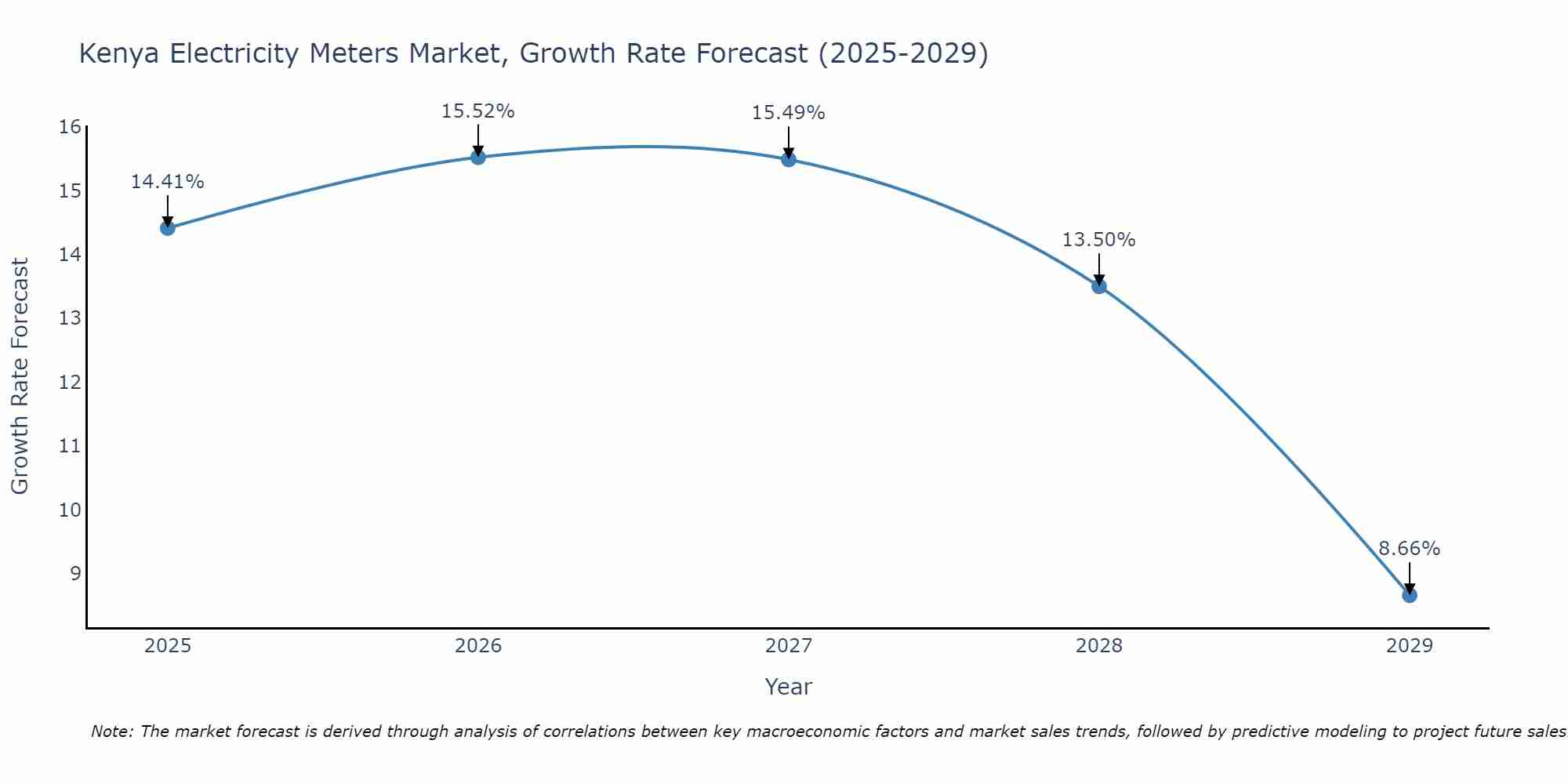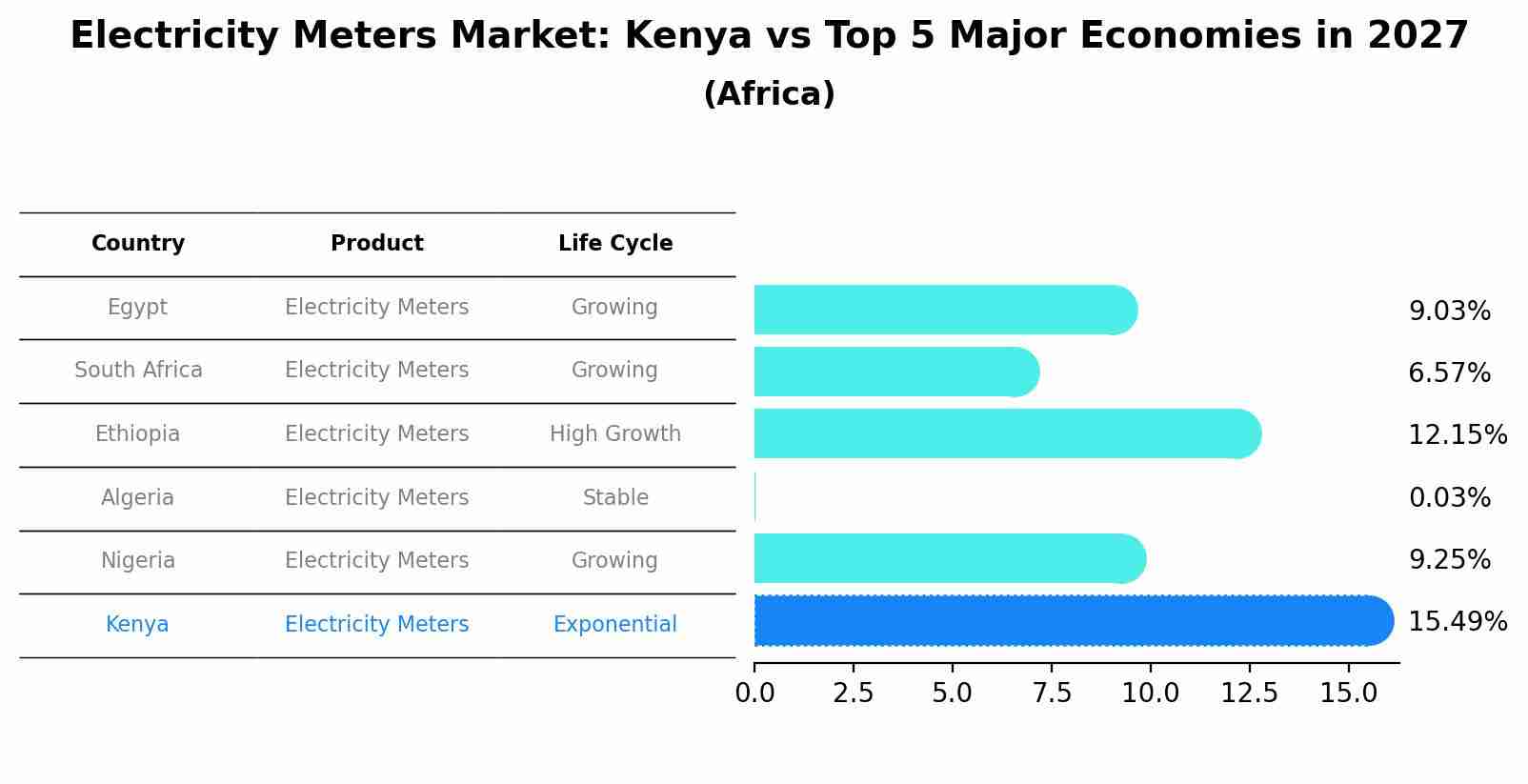Kenya Electricity Meters Market Outlook | Analysis, Trends, Industry, Growth, Size, Share, Forecast, COVID-19 IMPACT, Value, Revenue & Companies
| Product Code: ETC432946 | Publication Date: Oct 2022 | Updated Date: Jul 2025 | Product Type: Market Research Report | |
| Publisher: 6Wresearch | Author: Ravi Bhandari | No. of Pages: 75 | No. of Figures: 35 | No. of Tables: 20 |
Kenya Electricity Meters Market Size Growth Rate
The Kenya Electricity Meters Market is projected to witness mixed growth rate patterns during 2025 to 2029. Starting at 14.41% in 2025, the market peaks at 15.52% in 2026, and settles at 8.66% by 2029.

Electricity Meters Market: Kenya vs Top 5 Major Economies in 2027 (Africa)
The Electricity Meters market in Kenya is projected to grow at a exponential growth rate of 15.49% by 2027, within the Africa region led by Egypt, along with other countries like South Africa, Ethiopia, Algeria and Nigeria, collectively shaping a dynamic and evolving market environment driven by innovation and increasing adoption of emerging technologies.

Kenya Electricity Meters Market Synopsis
The Kenya Electricity Meters Market is experiencing significant growth driven by increasing urbanization, industrialization, and government initiatives towards electrification in rural areas. The market is characterized by a shift towards smart meters, aimed at improving accuracy in billing and monitoring energy consumption. Key players in the market include companies such as Landis+Gyr, Itron Inc., and Conlog. The market is also witnessing growing competition due to the entry of new players offering innovative solutions like prepaid meters and mobile-based payment systems. Regulatory reforms, such as the introduction of performance-based regulation by the Energy Regulatory Commission, are expected to further drive market growth by promoting efficiency and transparency in the sector. Overall, the Kenya Electricity Meters Market presents lucrative opportunities for manufacturers and suppliers catering to the country`s increasing demand for reliable electricity metering solutions.
Kenya Electricity Meters Market Trends
The Kenya electricity meters market is witnessing a shift towards smart meters to improve efficiency and accuracy in monitoring energy consumption. Smart meters offer real-time data on energy usage, enabling consumers to better manage their electricity consumption and utilities to optimize grid operations. The market is also experiencing a growing demand for prepaid meters due to their convenience and cost-effectiveness in managing electricity payments. Additionally, there is a focus on integrating renewable energy sources into the grid, driving the adoption of advanced meters capable of measuring and managing different energy sources. Overall, the Kenya electricity meters market is evolving towards smart and prepaid meters, driven by the need for greater efficiency, transparency, and sustainability in the energy sector.
Kenya Electricity Meters Market Challenges
In the Kenya Electricity Meters Market, some challenges include issues related to meter tampering and illegal connections, which result in revenue losses for utility companies. There is also a lack of standardized regulations governing metering practices, leading to inconsistencies and inefficiencies in the market. Additionally, the high cost of installing prepaid meters poses a barrier to widespread adoption, especially in low-income areas. Furthermore, the limited availability of skilled technicians for meter maintenance and repairs hinders the smooth functioning of the market. These challenges collectively impact the reliability of electricity supply, revenue collection for utility providers, and overall customer satisfaction in the Kenya Electricity Meters Market.
Kenya Electricity Meters Market Investment Opportunities
The Kenya Electricity Meters Market offers promising investment opportunities due to the country`s ambitious electrification projects and increasing demand for electricity. Smart meters, in particular, are becoming more popular as they provide real-time data and enable efficient energy management. With the government`s focus on expanding access to electricity and improving metering infrastructure, there is a growing need for advanced metering solutions in Kenya. Investors can capitalize on this trend by investing in companies that manufacture or distribute electricity meters, as well as those involved in metering technology and services. Additionally, opportunities exist in providing innovative payment solutions and value-added services for electricity consumers. Overall, the Kenya Electricity Meters Market presents a lucrative investment landscape with the potential for long-term growth and profitability.
Jordan Agar Market Government Policies
The Kenyan government has implemented various policies to regulate the electricity meters market in the country. One key policy is the Energy Act, which aims to promote competition, efficiency, and reliability in the electricity sector. The Energy Regulatory Commission (ERC) is responsible for overseeing the licensing and regulation of electricity meter providers to ensure compliance with quality standards and consumer protection. Additionally, the government has introduced initiatives such as the Last Mile Connectivity Project to increase access to electricity for households, which has led to a growing demand for electricity meters. Overall, these policies aim to enhance transparency, accountability, and sustainability in the Kenya Electricity Meters Market.
Kenya Electricity Meters Market Future Outlook
The Kenya Electricity Meters Market is expected to witness steady growth in the coming years due to increasing electrification efforts and the government`s focus on improving energy access across the country. The market is likely to be driven by the growing urbanization, industrialization, and infrastructure development in Kenya, leading to a rise in electricity consumption and the need for accurate metering solutions. Additionally, the deployment of smart meters and advanced technologies to enhance energy management and reduce losses is expected to further propel market growth. With initiatives aimed at promoting renewable energy sources and increasing energy efficiency, the Kenya Electricity Meters Market is poised for expansion, presenting opportunities for meter manufacturers and service providers to capitalize on the evolving energy landscape in the country.
Key Highlights of the Report:
- Kenya Electricity Meters Market Outlook
- Market Size of Kenya Electricity Meters Market, 2021
- Forecast of Kenya Electricity Meters Market, 2031
- Historical Data and Forecast of Kenya Electricity Meters Revenues & Volume for the Period 2018 - 2031
- Kenya Electricity Meters Market Trend Evolution
- Kenya Electricity Meters Market Drivers and Challenges
- Kenya Electricity Meters Price Trends
- Kenya Electricity Meters Porter's Five Forces
- Kenya Electricity Meters Industry Life Cycle
- Historical Data and Forecast of Kenya Electricity Meters Market Revenues & Volume By Type for the Period 2018 - 2031
- Historical Data and Forecast of Kenya Electricity Meters Market Revenues & Volume By Single Phase for the Period 2018 - 2031
- Historical Data and Forecast of Kenya Electricity Meters Market Revenues & Volume By Three Phase for the Period 2018 - 2031
- Historical Data and Forecast of Kenya Electricity Meters Market Revenues & Volume By Analog for the Period 2018 - 2031
- Historical Data and Forecast of Kenya Electricity Meters Market Revenues & Volume By Smart for the Period 2018 - 2031
- Historical Data and Forecast of Kenya Electricity Meters Market Revenues & Volume By Application for the Period 2018 - 2031
- Historical Data and Forecast of Kenya Electricity Meters Market Revenues & Volume By Residential for the Period 2018 - 2031
- Historical Data and Forecast of Kenya Electricity Meters Market Revenues & Volume By Commercial for the Period 2018 - 2031
- Historical Data and Forecast of Kenya Electricity Meters Market Revenues & Volume By Industrial for the Period 2018 - 2031
- Historical Data and Forecast of Kenya Electricity Meters Market Revenues & Volume By Others for the Period 2018 - 2031
- Kenya Electricity Meters Import Export Trade Statistics
- Market Opportunity Assessment By Type
- Market Opportunity Assessment By Application
- Kenya Electricity Meters Top Companies Market Share
- Kenya Electricity Meters Competitive Benchmarking By Technical and Operational Parameters
- Kenya Electricity Meters Company Profiles
- Kenya Electricity Meters Key Strategic Recommendations
Frequently Asked Questions About the Market Study (FAQs):
- Single User License$ 1,995
- Department License$ 2,400
- Site License$ 3,120
- Global License$ 3,795
Search
Thought Leadership and Analyst Meet
Our Clients
Related Reports
- Afghanistan Rocking Chairs And Adirondack Chairs Market (2026-2032) | Size & Revenue, Competitive Landscape, Share, Segmentation, Industry, Value, Outlook, Analysis, Trends, Growth, Forecast, Companies
- Afghanistan Apparel Market (2026-2032) | Growth, Outlook, Industry, Segmentation, Forecast, Size, Companies, Trends, Value, Share, Analysis & Revenue
- Canada Oil and Gas Market (2026-2032) | Share, Segmentation, Value, Industry, Trends, Forecast, Analysis, Size & Revenue, Growth, Competitive Landscape, Outlook, Companies
- Germany Breakfast Food Market (2026-2032) | Industry, Share, Growth, Size, Companies, Value, Analysis, Revenue, Trends, Forecast & Outlook
- Australia Briquette Market (2025-2031) | Growth, Size, Revenue, Forecast, Analysis, Trends, Value, Share, Industry & Companies
- Vietnam System Integrator Market (2025-2031) | Size, Companies, Analysis, Industry, Value, Forecast, Growth, Trends, Revenue & Share
- ASEAN and Thailand Brain Health Supplements Market (2025-2031) | Strategy, Consumer Insights, Analysis, Investment Trends, Opportunities, Growth, Size, Share, Industry, Revenue, Segments, Value, Segmentation, Supply, Forecast, Restraints, Outlook, Competition, Drivers, Trends, Demand, Pricing Analysis, Competitive, Strategic Insights, Companies, Challenges
- ASEAN Bearings Market (2025-2031) | Strategy, Consumer Insights, Analysis, Investment Trends, Opportunities, Growth, Size, Share, Industry, Revenue, Segments, Value, Segmentation, Supply, Forecast, Restraints, Outlook, Competition, Drivers, Trends, Demand, Pricing Analysis, Competitive, Strategic Insights, Companies, Challenges
- Europe Flooring Market (2025-2031) | Outlook, Share, Industry, Trends, Forecast, Companies, Revenue, Size, Analysis, Growth & Value
- Saudi Arabia Manlift Market (2025-2031) | Outlook, Size, Growth, Trends, Companies, Industry, Revenue, Value, Share, Forecast & Analysis
Industry Events and Analyst Meet
Whitepaper
- Middle East & Africa Commercial Security Market Click here to view more.
- Middle East & Africa Fire Safety Systems & Equipment Market Click here to view more.
- GCC Drone Market Click here to view more.
- Middle East Lighting Fixture Market Click here to view more.
- GCC Physical & Perimeter Security Market Click here to view more.
6WResearch In News
- Doha a strategic location for EV manufacturing hub: IPA Qatar
- Demand for luxury TVs surging in the GCC, says Samsung
- Empowering Growth: The Thriving Journey of Bangladesh’s Cable Industry
- Demand for luxury TVs surging in the GCC, says Samsung
- Video call with a traditional healer? Once unthinkable, it’s now common in South Africa
- Intelligent Buildings To Smooth GCC’s Path To Net Zero


















